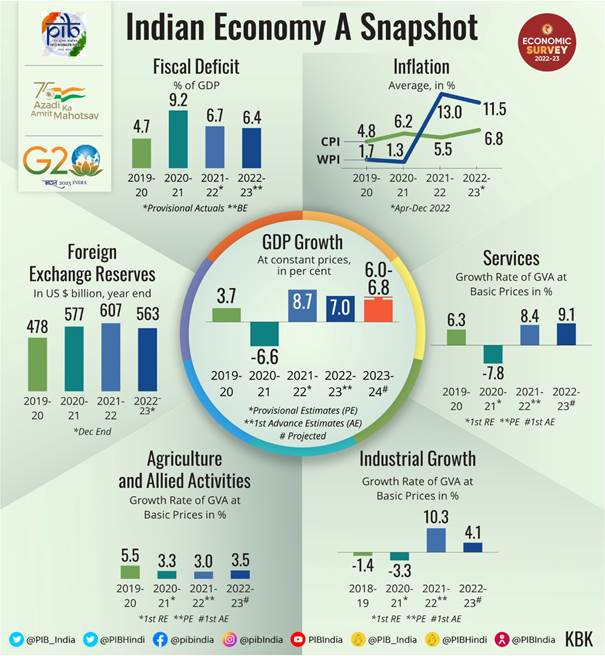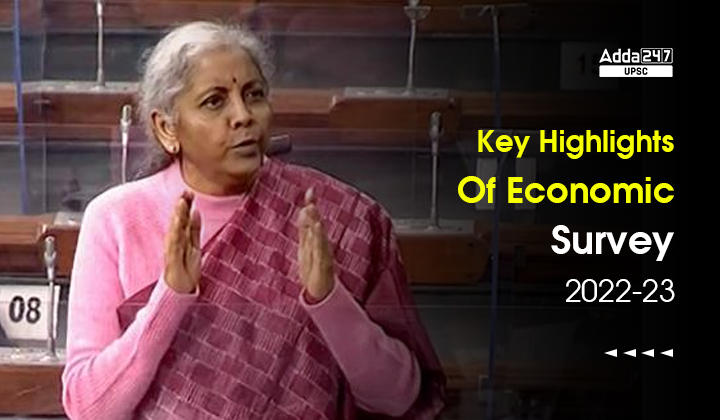Table of Contents
Key Highlights Of Union Economic Survey 2022-23: The Union Economic Survey 2022-23 includes the state of India’s economy in the current financial year i.e. 2022-23. The Union Economic Survey 2022-23 is segmented into two parts: Part A and Part B. The first part usually consists of the major economic developments in the year and a broad review of the economy and the second part covers specific issues like social security, poverty, education, healthcare, human development, and climate. Insights like India’s GDP growth outlook, inflation rate and projection, forex reserves, and trade deficits are also included in the Union Economic Survey 2022-23.
Economic Survey 2022-23 Context
- On January 31, 2023, the Union Minister for Finance and Corporate Affairs, Smt. Nirmala Sitharaman, presented the Union Economic Survey 2022-23 in the Union Parliament.
- The Union Economic Survey 2022-23 projected India’s economic growth at 6-6.8% for the next fiscal year, starting April 1, 2023 while the country economy to grow at around 7% in the ongoing financial year.
About Union Economic Survey
The Economic Survey comes a day before the Budget is presented. It releases on January 31 by Union Finance Minister.
What did last year’s survey say?
- Last year’s Union Economic Survey had predicted India’s economy to grow at 8-8.5 per cent in the fiscal beginning April 1, 2022.
- It also said that India is well placed to meet the future challenges on the back of widespread vaccine coverage, supply-side reforms and easing of regulations.
When was the first Economic Survey released?
- India’s first Economic Survey was presented in 1950-51.
- The document was presented with the Union Budget till 1964.
- Later, it was separated and presented before the Budget announcement.
Who Prepared & Presented Economic Survey 2022-23?
Who Prepared? The Union Economic Survey 2022-23, prepared by the Department of Economic Affairs (DEA) under the guidance of Chief Economic Advisor V Anantha Nageswaran.
Who Presented? the Union Minister for Finance and Corporate Affairs, Smt. Nirmala Sitharaman, presented the Union Economic Survey 2022-23 in the Union Parliament.
Key Highlights Of The Economic Survey 2022-23
The Key Highlights of the Union Economic Survey 2022-23 are as follows:

- The Union Economic Survey 2022-23 has projected that for FY24 India’s GDP will grow between 6-6.8%.
- India’s Union Economic Survey 2022-23 pegs FY24 base-line nominal GDP growth at 11%.
- Economic Survey 2023 expected the Indian economy to grow at around 7% in the ongoing financial year 2023-24.
- The Union Economic Survey 2022-23 has cautioned that the Indian rupee may come under pressure if the Current Account Deficit (CAD) continues to widen.
- The Union Economic Survey 2022-23 sees loss of export stimulus further possible.
- The Union Economic Survey 2022-23 is confident that India’s growth story is driven by strong fundamentals.
- According to The Union Economic Survey 2022-23, the GDP growth will be driven by higher capital expenditure, private consumption, credit growth to small businesses, strengthening corporate balance sheet and return of migrant workers to cities.
- Slowing world growth, shrinking global trade led to loss of export stimulus in 2nd half of current year, according to Economic Survey.
- The Union Economic Survey 2022-23 has pointed out that the Indian economy has nearly “recouped” what was lost. It has “renewed” what had paused, and “renerengised” what had slowed during the pandemic and since the conflict in Europe.
- Economic Survey 2023 has highlighted that India is the fifth largest economy in terms of the exchange rate and the third largest in terms of purchasing power parity.
- The Union Economic Survey 2022-23 is confident that despite the GDP growth slowing down in financial year 2023-24, India will continue to be fastest growing economy in the world.
- According to The Union Economic Survey 2022-23, the GDP growth will be driven by higher capital expenditure, private consumption, credit growth to small businesses, strengthening corporate balance sheet and return of migrant workers to cities.
- Retail inflation is back within RBI’s target range in November 2022.
- Direct Tax collections for the period April-November 2022 remains buoyant.
- Enhanced Employment generation seen in the declining urban unemployment rate and in the faster net registration in Employee Provident Fund.
- Creating public goods to enhance opportunities, efficiencies and ease of living, trust-based governance, enhancing agricultural productivity and promoting the private sector as a co-partner in development is the focus of the government reforms.
- Cleaner balance sheets led to enhanced lending by financial institutions.
- India’s e-commerce market is projected to grow at 18 per cent annually through 2025
- Merchandise exports of US$ 332.8 billion for April-December 2022.
- PM GatiShakti National Master Plan creates comprehensive database for integrated planning and synchronised implementation across Ministries/ Departments
- UPI-based transactions grew in value (121 per cent) and volume (115 per cent) terms, between 2019-2022, paving the way for its international adoption.
The Union Economic Survey 2022-23: Recovery from Covid
- The Union Economic Survey 2022-23 says that recovering from pandemic-induced contraction, Russian-Ukraine conflict and inflation, Indian economy is staging a broad based recovery across sectors, positioning to ascend to the pre-pandemic growth path in FY23.
- India’s GDP growth is expected to remain robust in FY24. GDP forecast for FY24 to be in the range of 6-6.8 %.
- Economic growth to be boosted from the expansion of public digital platforms and measures to boost manufacturing output.
India’s Medium Term Growth Outlook
- During the period of 2014-2022, the Indian Economy underwent a gamut of wide-ranging structural and governance reforms that strengthened the economy’s fundamentals by enhancing its overall efficiency.
- The Economic Survey highlights that the above transformative reforms undertaken by the government had lagged growth returns due to temporary shocks in the economy.
- However, in the present decade, the presence of strong medium-term growth magnets provides optimism and hope that once these global shocks of the pandemic and the spike in commodity prices in 2022 fade away, the Indian economy is well placed to grow faster in the coming decade.
- This situation is analogous to the period 1998-2002 when transformative reforms undertaken by the government had lagged growth returns due to temporary shocks in the economy. Once these shocks faded, the structural reforms paid growth dividends from 2003.
- Similarly, the Indian economy is well placed to grow faster in the coming decade once the global shocks of the pandemic and the spike in commodity prices in 2022 fade away.
- With improved and healthier balance sheets of the banking, non-banking and corporate sectors, a fresh credit cycle has already begun, evident from the double-digit growth in bank credit over the past months.
- Indian economy has also started benefiting from the efficiency gains resulting from greater formalisation, higher financial inclusion, and economic opportunities created by digital technology-based economic reforms.



 TSPSC Group 1 Question Paper 2024, Downl...
TSPSC Group 1 Question Paper 2024, Downl...
 TSPSC Group 1 Answer key 2024 Out, Downl...
TSPSC Group 1 Answer key 2024 Out, Downl...
 UPSC Prelims 2024 Question Paper, Downlo...
UPSC Prelims 2024 Question Paper, Downlo...




